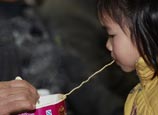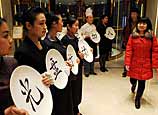
DAVOS, Switzerland, Jan. 27 (Xinhua) -- China is determined to pursue the internationalization of the renminbi on a market-oriented basis, and will closely watch the spillover effects of Japan's ultra-loose monetary policy, Yi Gang, a vice governor of China's central bank, told Xinhua.
LET RENMINBI COMPETE FAIRLY
"It is the basic policy of the People's Bank of China (PBOC) to let the renminbi compete with U.S. dollar or euro fairly in the international market," Yi said in an interview on the sidelines of the annual meeting of the World Economic Forum (WEF) Saturday.
In the past, it was not allowed to use the renminbi in cross-border trade transactions and investments. "What we are doing now is nothing but remove discrimination against the renminbi and let it act just as other reserve currencies," he said.
On concerns about the potential rise of the Chinese currency, Yi said, "It is just natural that foreigners might have some concerns, but it is not our policy to specifically promote the renminbi, and I hope people of other countries can treat it with calm."
"Whether the pace of the internationalization is a little bit quicker or slower, it is always and completely the choice of the market," he added.
"I would be actually pleased to see people have more confidence in the renminbi and choose it over other currencies thanks to a more sophisticated market, better implementation of China's monetary policy, China's macroeconomic stability and social stability, and stronger rule of law," he said.
SPILLOVER EFFECT OF JAPAN'S MONETARY POLICY
Yi also said China will have to watch closely the spillover effects of Japan's newly adopted ultra-loose monetary policy.
"We will closely watch the spillover effects of the new Japanese policy on the world economy, the emerging market in particular," he said.
"Japan aside, the United States and the European Central Bank have also adopted policies of quantitative easing, which would drastically increase global liquidity and cross-border capital flow, either inflow or outflow, which is unstable," said Yi.
The new policy of Japan would also "have the risk of triggering a race among countries to devaluate their currencies," he said.
RENMINBI EXCHANGE RATE CLOSE TO EQUILIBRIUM
On the exchange rate of the Chinese currency, Yi said the renminbi exchange rate is "relatively close" to equilibrium level and the supply and demand in the market is generally in balance.
"The most convincing evidence to support this is that China's newly added foreign exchange reserve last year was the least over the past five years," Yi told Xinhua.
"This means that the central bank doesn't have to intervene in the market on a large scale, and the slower pace of growth in our foreign exchange reserve is a good thing," he added.
















 Grandparents who leave homes to live in the cities and take care of their children's children are a growing demographic.
Grandparents who leave homes to live in the cities and take care of their children's children are a growing demographic.


![]()
